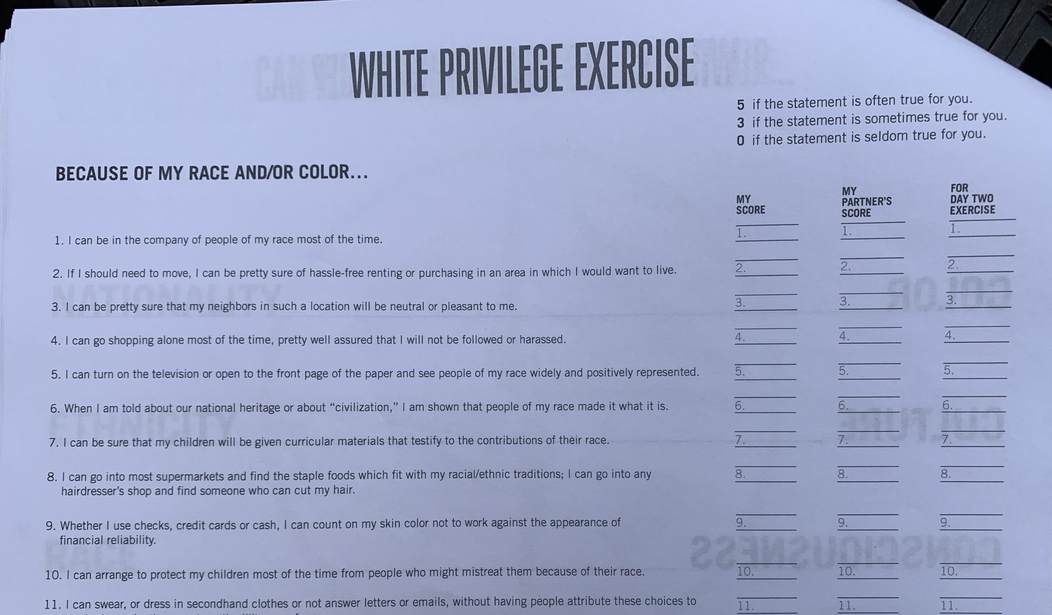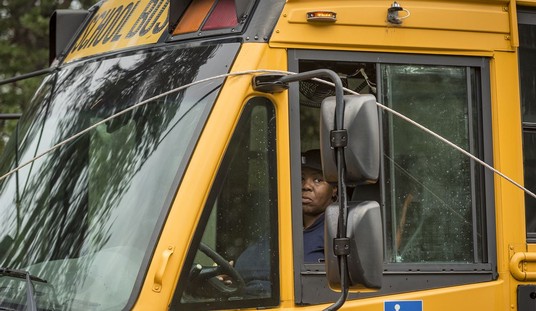Teachers at Colorado’s Cherry Creek School District have been presented with a “white privilege” survey in an effort to make sure they treat racial minority students well. Yet the survey and the documents accompanying it teach a radical version of political correctness that will arguably promote racial division. An anonymous teacher from the district sent PJ Media the packet, and Cherry Creek Schools verified its authenticity. The district said the survey was not mandatory.
The “white privilege” exercise asked teachers to rate how true a series of statements are for them and for their partners before and after a racial awareness training. Each statement is meant to begin with “Because of my race and/or color…” Here are ten of the 26 statements:
I can be in the company of people of my race most of the time.
If I should need to move, I can be pretty sure of hassle-free renting or purchasing in an area in which I would want to live.
I can turn on the television or open to the front page of the paper and see people of my race widely and positively represented.
When I am told about our national heritage or about “civilization,” I am shown that people of my race made it what it is.
I can be sure that my children will be given curricular materials that testify to the contributions of their race.
I can go into most supermarkets and find the staple foods which fit with my racial/ethnic traditions; I can go into any hairdresser’s shop and find someone who can cut my hair.
I can criticize our government and talk about how much I feel its policies and behavior without being seen as a racial outsider.
I can be pretty sure that if I ask to talk to “the person in charge,” I will be facing a person of my race.
If a police officer pulls me over, I can be sure I haven’t been singled out because of my race.
I can go home from most meetings of organizations I belong to feeling somewhat tied in, rather than isolated, out of place, outnumbered, unheard, feared or hated.
Many of these statements have nothing to do with race, except in the obvious context of the survey. For instance, expecting a “hassle-free renting or purchasing” experience for housing “in an area in which I would want to live” depends on a wide number of factors, from credit score to income to personal taste. As for “the person in charge,” all sorts of establishments are owned by racial minorities.
The feeling of being welcomed — “tied in, rather than isolated, out of place, outnumbered, unheard, feared or hated” — is elusive, since most human groups are exclusionary in one form or another. Conservatives and Trump supporters in America’s increasingly polarized political climate may feel feared or hated more than many racial minorities.
Following an article about “What Does It Mean to Be White?” by Robin DiAngelo in The Seattle Times, a page of the pamphlet asks that exact question. It outlines three aspects of whiteness:
Segregation: Most whites live, grow, play, learn, love, work and die primarily in racial segregation. Yet, our society does not teach us to see this as a loss.
Individualism: Whites are taught to see themselves as individuals, rather than as part of a racial group. It follows that whites are racially objective and thus can represent the universal human experience, while people of color can only represent their race.
Focus on intentions over impact: We are taught that racism must be intentional and that only bad people commit it. Thus a common white reasoning in cross racial conflicts is that as long as we are good people and don’t intend to perpetuate racism, then our actions don’t count as racism.
White Fragility: In a white-dominant society, challenges to a white worldview are uncommon. The racial status quo is comfortable for us. We haven’t had to develop the skills, perspectives or humility that would help us engage constructively. As a result, we have very little tolerance for racial discomfort and respond poorly.
According to the pamphlet, only whites are “taught to see themselves as individuals.” The very concept of individuality is meant to apply to all people, but according to this pamphlet, the teaching implies “that whites are racially objective and thus can represent the universal human experience, while people of color can only represent their race.” Why can’t people of all races be approached as individuals?
Part of the answer has to do with power. The grievance culture gives the left an edge. If liberals can claim that American society is fundamentally racist, then they must be given power to fix it. Of course, many liberals are well-meaning and intend merely to correct inequalities. But the narrative of institutional racism is also a political weapon.
So the pamphlet includes a page focused on “racial consciousness and the privilege of whiteness: stages of avoidance.” In other words, disagreeing with the view of institutional racism is a form of psychological denial, not a legitimate point of a view.
According to the pamphlet, statements like “We’re all just human!” are an example of racial “ignorance.” Suggestions that serious progress has been made on racial issues are examples of “denial.” Claims that something “isn’t a race issue” but rather concerns “personal responsibility” are examples of “redefinition” or “minimization.”
Abbe Smith, chief communications officer at Cherry Creek Schools, confirmed that the pamphlet was genuine. Yes, these worksheets are a part of our Beyond Diversity training, that many of our teachers and staff, though not all, have taken,” she told PJ Media. She said the training, and the “white privilege” survey, are not mandatory.
When asked to respond to accusations that the training advocated a racial identity politics, Smith disagreed with that characterization.
“I disagree with your interpretation of the training and would also suggest that you are taking the selected worksheets out of context,” Smith said. “The exercise is intended to help participants reflect on their own racial identity and to think about how their experience in the world shapes their identity and impacts how they view other people.”
“The goal is for staff to have access to a common language with which to engage in productive conversations about race. Ultimately, each of us in the district has a role in ensuring that all students feel safe, welcomed and valued in school and can reach their potential,” she concluded.
It is valuable for teachers to understand the experiences of racial minorities, but this pamphlet seems to go beyond that. In recent years, colleges and universities have offered classes on the “consequences” of “whiteness,” and a Columbia University training urged K-12 teachers to combat “whiteness.” These approaches often involve teaching that “whiteness” is inherently colonialist and oppressive, a message that often ends up demonizing people based on the color of their skin.
Poverty, not wealth, is the natural human condition. The real question is not why people fail to become rich, but how to move from poverty to wealth. The talk of “white privilege” often ignores the disproportionate success of Asians, especially in American academics. Is there such a thing as “Asian privilege?”
Human beings have a tribal instinct to join together in groups and vilify outsiders. Racism is just one form of this deeper tribalism. For instance, the term “white” once excluded Eastern Europeans and the Irish. Focusing on these divisions arguably makes tensions worse, not better. While America has an ugly racial past, people of all races have contributed to its success and it holds promise for people of all races. Americans should strive to have a society where anyone can “make it,” regardless of his or her background.
Classes on “white privilege” seem counterproductive to that goal. A recent study found that such classes do not make either liberals or conservatives more sympathetic to the plight of black people, but they do make liberals less empathetic toward poor whites, and more likely to blame them for their poverty.
Follow Tyler O’Neil, the author of this article, on Twitter at @Tyler2ONeil.













Join the conversation as a VIP Member